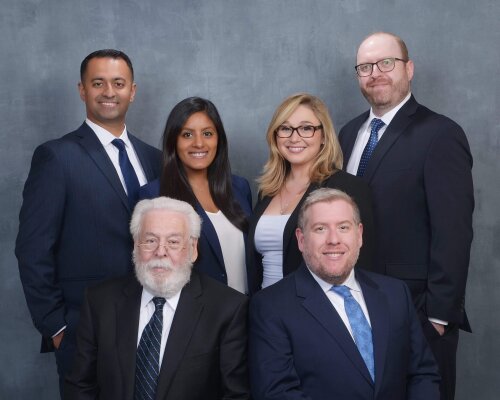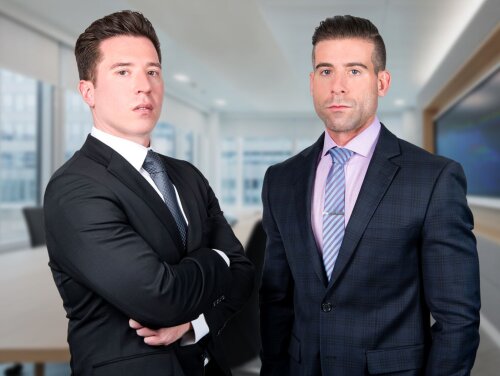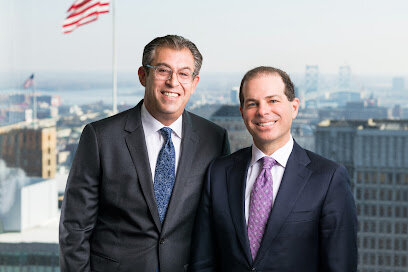Best Sexual Abuse Lawyers in Philadelphia
Share your needs with us, get contacted by law firms.
Free. Takes 2 min.
List of the best lawyers in Philadelphia, United States
About Sexual Abuse Law in Philadelphia, United States
Sexual abuse covers a range of criminal and civil wrongs involving unwanted sexual contact, assault, exploitation, or sexual activity with someone who cannot legally consent. In Philadelphia, sexual abuse matters are handled under Pennsylvania law and through local criminal justice, child protection, and victim services systems. Cases may lead to criminal charges brought by the state, civil suits for damages, administrative proceedings in schools or workplaces, and protective-order actions to keep someone safe. Because these matters involve physical safety, evidence preservation, and sensitive procedures, prompt action and knowledgeable legal guidance are important.
Why You May Need a Lawyer
Victims and survivors - A lawyer can explain reporting options, help you navigate communications with police and prosecutors, assist in securing protective orders, pursue civil claims for damages, represent you in hearings, help obtain victim compensation, and protect your privacy and rights during criminal or civil proceedings.
Parents and guardians - If a child is involved, an attorney can guide you on mandatory reporting, interactions with child protective services, criminal investigations, and civil remedies including claims against institutions or caretakers.
Accused persons - If you are accused of sexual abuse, you need immediate criminal defense counsel to protect your constitutional rights, advise on plea offers, challenge evidence, and prepare for court.
Employees and students - A lawyer can help with workplace discipline, Title IX or school disciplinary processes, employment law claims, and civil remedies for harassment or retaliation.
Local Laws Overview
Criminal framework - Pennsylvania criminal law defines multiple sexual offenses. Prosecutors in Philadelphia bring charges when there is probable cause that a criminal sexual act occurred. The severity of the charge and potential penalties depend on factors such as the nature of the conduct, the age and capacity of the alleged victim, use of force, and any prior convictions.
Consent and capacity - Pennsylvania law emphasizes consent and the ability to consent. Factors like age, intoxication, mental incapacity, or coercion can mean a person cannot legally consent to sexual activity.
Age-of-consent rules - State law sets an age below which a person cannot legally consent to sexual activity. Sexual acts with minors can produce criminal charges even if the minor purportedly agreed.
Mandatory reporting - Certain professionals and caregivers are required by Pennsylvania law to report suspected child abuse, including sexual abuse, to child protective authorities and law enforcement. Failure to report when required can carry penalties.
Protective orders - Victims can seek civil protective orders to restrict contact and create safety zones. These orders can be filed in family court or civil court depending on circumstances.
Victim services and compensation - Pennsylvania and Philadelphia offer victim-witness services, crime victim compensation programs, and medical forensic examinations. These services can help with immediate needs, counseling, and some financial losses related to the crime.
Civil remedies - Survivors can sometimes bring civil lawsuits for assault, battery, intentional infliction of emotional distress, negligence, or claims against institutions that failed to protect them. Time limits - called statutes of limitations - apply to civil claims and vary by claim type and by changes in state law, so timing is critical.
Sex-offender registry and community notification - Convictions for certain sexual offenses result in registration requirements and possible community notification. These rules affect housing, employment, and other long-term consequences.
Frequently Asked Questions
What should I do immediately after an incident of sexual abuse?
Ensure your immediate safety - get to a safe place and contact law enforcement if you are in danger. Seek medical care as soon as possible, even if you do not plan to report right away. Medical providers can treat injuries, test for sexually transmitted infections, provide emergency contraception when appropriate, and preserve forensic evidence if collected. Consider contacting a victim advocate or crisis hotline for emotional support and help understanding your options.
Should I report the abuse to the police?
Reporting is a personal decision. Reporting can start a criminal investigation, lead to charges, and connect you to victim services. If you are unsure, you can contact a victim advocate, a lawyer, or a trusted medical provider to discuss the implications. Be aware that evidence preservation and timing can affect prosecutorial options.
Can I get a protection order in Philadelphia?
Yes. If you fear harm or harassment, you can seek a civil protection order to restrict the alleged abuser from contacting you or coming near you. There are different types of orders depending on your relationship with the respondent. An attorney, victim advocate, or court staff can explain the process and help with filing.
What is a sexual assault forensic exam or rape kit and do I have to report to get one?
A sexual assault forensic exam collects physical evidence that may be used in criminal investigations. In many hospitals you can consent to an exam and choose whether to report to the police immediately. Preservation rules for anonymous or unreported kits vary, so speak with hospital staff or a victim advocate about options and timeframes.
How long do I have to file a civil lawsuit for sexual abuse?
Time limits vary depending on the type of claim and recent state law changes. In many cases involving childhood sexual abuse, special rules or extensions may apply. Because statutes of limitations are complex and time-sensitive, consult an attorney promptly to determine applicable deadlines for your situation.
Will I have to testify or face the accused in court?
If a case goes to trial, victims and witnesses are often asked to testify. Prosecutors and judges may use protective procedures to minimize trauma, such as testifying via closed-circuit television, using screens, or limiting direct confrontation, when allowed by law. Your prosecutor or attorney can explain what to expect and request accommodations where available.
Can I sue my employer, school, or another institution for sexual abuse that occurred there?
Possibly. Institutions can be liable if they knew or should have known about a risk and failed to take reasonable steps to prevent abuse. Employment and education laws may offer separate remedies for harassment, discrimination, or failure to respond. A civil attorney can evaluate the facts and advise on potential claims.
What if I am accused of sexual abuse - what are my rights?
If you are accused, you have the right to remain silent, the right to an attorney, and the right to due process. Contact a criminal defense lawyer immediately before speaking with investigators. Do not post about the case or contact alleged victims, as that can harm your defense and lead to additional charges.
Are records from a sexual assault exam or police report confidential?
Certain records may be kept confidential to protect privacy, but rules differ by record type. Medical records are generally confidential under health privacy laws, but may be shared for legal proceedings. Police reports and court filings can contain personal information that may become part of the public record. Ask your attorney or a victim advocate about privacy protections and options to seal or limit disclosure where available.
How can I find a lawyer who handles sexual abuse cases in Philadelphia?
Look for attorneys with experience in sexual assault, criminal defense, civil litigation, family law, or child protection depending on your needs. Ask about experience with similar cases, client support services, fee structure, and whether they work with victim advocates. Local bar associations, victim service organizations, and legal aid groups can help you identify qualified attorneys. Many attorneys offer initial consultations to discuss your case.
Additional Resources
Philadelphia Police Department - for reporting crimes and immediate assistance
Philadelphia District Attorney - Special Victims or Victim-Witness Unit - handles prosecutions and victim support
Pennsylvania Department of Human Services - Child protective services and ChildLine for suspected child abuse reporting
Pennsylvania Office of the Victim Advocate and state crime victim compensation programs - for information on financial help and rights
Local sexual assault crisis centers and hospital Sexual Assault Nurse Examiner - SANE - programs for medical care and advocacy
National hotlines and support organizations for crisis counseling and referral services
Local bar association and legal aid organizations for referrals to attorneys who handle sexual abuse, criminal defense, family law, and civil suits
Next Steps
1. If you are in danger - call 911 or get to a safe place immediately.
2. Seek medical care - for injuries, testing, treatment, and evidence preservation even if you are undecided about reporting.
3. Consider reporting - contact law enforcement or child protective services if applicable. You can also consult a victim advocate for guidance before reporting.
4. Contact a lawyer or legal referral service - ask for someone experienced in sexual abuse matters. If you cannot afford a lawyer, ask about pro bono or legal aid options.
5. Preserve evidence and records - keep any messages, photos, clothing, medical paperwork, and notes about dates, times, and witnesses. Do not alter potential evidence.
6. Use victim services - victim advocates can help with safety planning, court accompaniment, navigating medical and counseling services, and applying for victim compensation.
7. Be mindful of deadlines - statutes of limitations and filing deadlines can affect civil claims and certain administrative remedies. Seek legal advice promptly to protect your options.
8. Protect your privacy and safety online - consider restricting social media posts about the incident and consult with your attorney about communications that could affect your case.
Remember - this guide provides general information, not legal advice. Laws and procedures change, and individual circumstances vary. For case-specific advice and representation, contact a licensed attorney in Philadelphia who specializes in sexual abuse or related areas of law.
Lawzana helps you find the best lawyers and law firms in Philadelphia through a curated and pre-screened list of qualified legal professionals. Our platform offers rankings and detailed profiles of attorneys and law firms, allowing you to compare based on practice areas, including Sexual Abuse, experience, and client feedback.
Each profile includes a description of the firm's areas of practice, client reviews, team members and partners, year of establishment, spoken languages, office locations, contact information, social media presence, and any published articles or resources. Most firms on our platform speak English and are experienced in both local and international legal matters.
Get a quote from top-rated law firms in Philadelphia, United States — quickly, securely, and without unnecessary hassle.
Disclaimer:
The information provided on this page is for general informational purposes only and does not constitute legal advice. While we strive to ensure the accuracy and relevance of the content, legal information may change over time, and interpretations of the law can vary. You should always consult with a qualified legal professional for advice specific to your situation.
We disclaim all liability for actions taken or not taken based on the content of this page. If you believe any information is incorrect or outdated, please contact us, and we will review and update it where appropriate.












